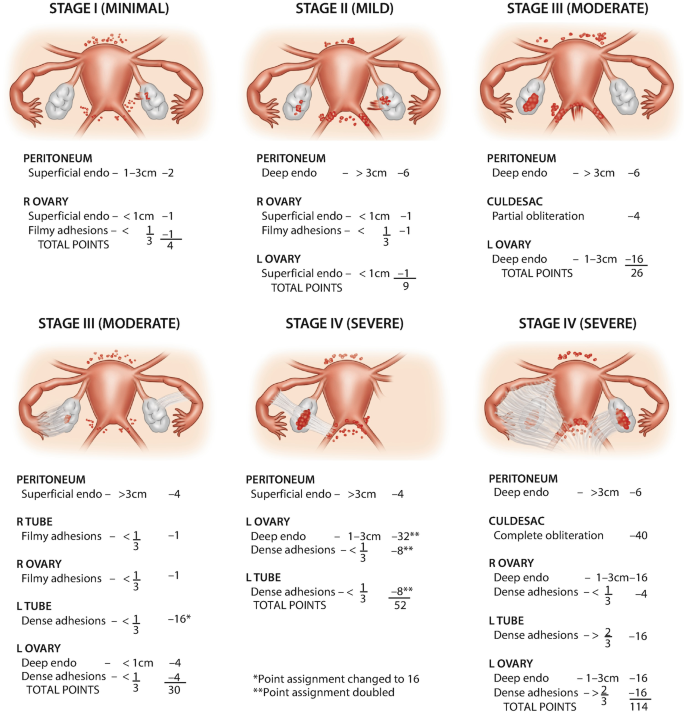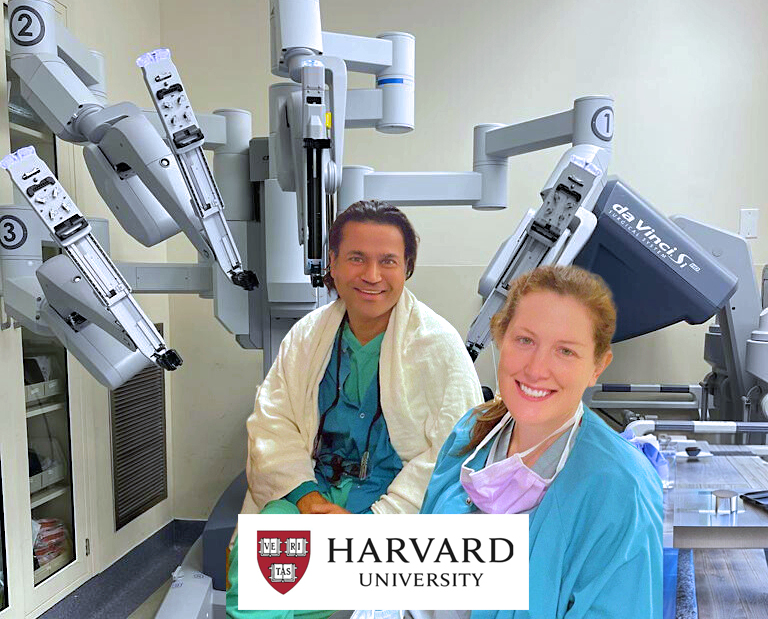Stage 3 Endometriosis
Stage 3 endometriosis is characterized by the presence of moderate to severe lesions and adhesions on pelvic organs, potentially leading to significant pain, inflammation, and reduced fertility.
Stage 3 endometriosis represents a more advanced level of the condition within the established staging system. In this stage, the endometrial-like tissue has developed into larger and deeper implants that can affect various pelvic structures, including the ovaries, fallopian tubes, and uterus. These implants may form cysts called endometriomas and create adhesions, which are abnormal bands of tissue that cause organs to stick together. As a result, individuals with Stage 3 endometriosis commonly experience moderate to severe pelvic pain, especially during menstruation and sexual activity.
The symptoms might also extend beyond the pelvic region, leading to gastrointestinal discomfort, urinary issues, and overall decreased quality of life. Fertility problems can become more pronounced at this stage due to the increased extent of tissue involvement and the potential obstruction of fallopian tubes or distortion of reproductive organs. Accurate diagnosis and a comprehensive management approach are crucial to address pain, manage inflammation, and consider fertility options for those seeking to conceive.

Stages of Endometriosis (Image source: Springer Nature Switzerland AG, 2022)
Symptoms of Stage 3 Endometriosis
Stage 3 endometriosis is characterized by the presence of moderate to severe lesions, adhesions, and tissue involvement in the pelvic region. As a result, individuals with Stage 3 endometriosis often experience a range of symptoms that can significantly impact their daily lives. These symptoms may include:
- Severe Pelvic Pain: Women with Stage 3 endometriosis often experience severe pelvic pain, especially during menstruation, sexual intercourse, and ovulation. The pain can radiate to the lower back and thighs.
- Dyspareunia: Painful sexual intercourse (dyspareunia) is a prevalent symptom in Stage 3 endometriosis, caused by the presence of endometrial tissue and adhesions in the pelvic area.
- Gastrointestinal Symptoms: Endometrial implants on or near the intestines can lead to gastrointestinal issues such as bloating, abdominal pain, cramping, constipation, and diarrhea.
- Urinary Issues: Lesions affecting the bladder or ureters can cause urinary symptoms like frequent urination, urgency, pain during urination, and sometimes blood in the urine.
- Infertility: Stage 3 endometriosis can result in fertility problems due to adhesions obstructing the fallopian tubes or affecting the ovaries’ function, potentially leading to difficulties in conceiving.
- Painful Bowel Movements: Endometrial tissue on the bowel can cause pain and discomfort during bowel movements, often accompanied by rectal bleeding.
- Chronic Fatigue: The persistent pain, inflammation, and hormonal imbalances associated with Stage 3 endometriosis can lead to chronic fatigue and a decrease in energy levels.
These symptoms can vary in severity among individuals and can significantly impact daily life.
If you suspect you may have endometriosis or are experiencing any symptoms of concern, it’s essential to request an appointment with New York Gynecology Endometriosis (NYGE) to seek medical advice and evaluation.
Life-threatening Complications in Stage 3 Endometriosis
While Stage 3 endometriosis primarily involves moderate to severe lesions and adhesions within the pelvic region, it can potentially lead to life-threatening complications in certain cases. One such complication is ovarian endometrioma rupture. As endometrial cysts (endometriomas) grow on the ovaries, they can become large and fragile. If an endometrioma ruptures, it can cause sudden and severe abdominal pain, internal bleeding, and even lead to hemorrhagic shock, which is a life-threatening condition requiring immediate medical attention and surgical intervention to stop the bleeding and prevent further complications.
Another serious complication is bowel obstruction or perforation. As endometrial implants spread to the bowels and intestinal walls, they can lead to the formation of adhesions and scar tissue. In some instances, these adhesions can cause a partial or complete bowel obstruction, resulting in severe abdominal pain, vomiting, and an inability to pass stool. In more severe cases, the bowel wall can become weakened and perforated, leading to infection, sepsis, and a critical medical emergency that demands prompt surgical intervention and intensive medical care to prevent further deterioration.
Diagnosis of Stage 3 Endometriosis
Diagnosing stage 3 endometriosis involves:
Medical History and Symptoms: Your doctor learns about your periods, pain (where, how long, how strong), and other issues like pain during sex, using the bathroom, etc. This helps them understand your problems.
Physical Exam: The doctor checks your pelvic area for problems or discomfort. But it’s important to know that endometriosis can’t always be confirmed just from this.
Imaging Tests: Pictures like ultrasounds or MRI scans can help, but they might not always show endometriosis clearly. They can sometimes show things like cysts on ovaries or scar tissue, but not always smaller or deeper issues.
Laparoscopic Surgery: This is the best way to diagnose Stage 3 endometriosis. It’s a small surgery where a tiny camera is put into your belly through a small cut. The doctor can then see your organs and find problems like endometriosis, scars, or other issues. They might also take small samples to be sure.
Early diagnosis and intervention can lead to more effective management and improved quality of life for individuals with endometriosis.
Surgical Treatment for Stage 3 Endometriosis
Surgery for Stage 3 endometriosis usually includes laparoscopic surgery, a less invasive procedure to address endometriotic growths, scar tissue, and related problems, with the specific techniques tailored to each patient’s condition.
Laparoscopy
Laparoscopy is a common surgical approach used to treat Stage 3 endometriosis. In this procedure, small incisions are made in the abdomen, and a thin tube with a camera (laparoscope) is inserted to visualize and treat endometriotic growths, scar tissue, and associated issues. The surgical techniques employed can vary based on individual factors and the extent of the endometriosis.
According to Healthcare Bluebook, the cost of laparoscopic excision of endometriosis can vary depending on the location, healthcare provider, and type of insurance. On average, the cost of the procedure can range from $4,000 to $15,000. It’s important to note that these are estimated costs and may not reflect the actual cost you may incur.
To obtain an accurate cost estimate, it is advisable to request an appointment with New York Gynecology Endometriosis (NYGE).
Excision or Ablation
For Stage 3 endometriosis, surgical treatment often involves choosing between two main methods: excision or ablation.
- Excision: This surgical approach involves completely removing the endometriotic tissue, which can provide longer-lasting relief from symptoms by addressing the root cause.
- Ablation: This technique uses energy, like lasers or electrical currents, to destroy the endometriotic tissue. While less invasive, it might not be as effective for deeper or widespread lesions.
The choice between excision and ablation depends on factors like the severity and location of endometriosis, as well as the patient’s preferences and goals.
Robotic Surgery
Robotic surgery has emerged as a promising surgical treatment option for addressing Stage 3 endometriosis. This advanced technique involves the use of robotic-assisted systems that provide surgeons with enhanced precision and maneuverability. During the procedure, small incisions are made, and specialized robotic instruments, controlled by the surgeon, are inserted. These instruments offer a wide range of motion and articulation, allowing for intricate movements within the confined spaces of the abdomen. The surgeon operates the robotic system from a console, guiding the instruments with exceptional accuracy.
One of the key advantages of robotic surgery for Stage 3 endometriosis is its ability to navigate complex anatomical structures and remove deeply infiltrated endometriotic implants and scar tissue. This approach offers the potential for reduced trauma to surrounding tissues, minimal blood loss, and smaller incisions compared to traditional open surgery. These benefits can contribute to a shorter recovery time and potentially less post-operative discomfort for patients. However, the decision to undergo robotic surgery should be made in collaboration with a skilled gynecologic surgeon such as Dr Pankaj Singhal who can assess the patient’s specific condition, taking into account factors such as the extent of endometriosis and the patient’s overall health, to determine the most appropriate treatment approach.
- Dr Pankaj Singhal performed more than 10,000 robotic gynecologic, endometriosis and cancer surgeries.
- He is known for taking on the most challenging surgery cases that other doctors or centers turn away.
Pankaj Singhal, MD, MS, MHCM
Master Surgeon in Robotic Surgery
Dr. Pankaj Singhal, a globally recognized endometriosis surgeon, possesses over 25 years of expertise in laparoscopic excision surgery, enabling him to tackle even the most challenging endometriosis cases with confidence. Dr. Pankaj treats patients with diverse endometriosis-related conditions, ranging from ovarian endometriomas to severe deep infiltrating endometriosis that affects the bowels and other organs.
Dr. Pankaj prioritizes minimally invasive surgery and provides comprehensive personal care. Additionally, he is the owner and founder of New York Gynecology and Endometriosis (NYGE), and has dedicated his life to advocating for, respecting, and treating women suffering from this little-known disease. He is one of the few surgeons in the entire United States who have completed over 5,718 robot-assisted gynecologic surgeries.

We Accept Most Major Insurance Plans
Convenient Billing Options for Comprehensive Coverage.
Surgeries are typically covered by health insurance. However, the extent of coverage can vary depending on the specific insurance plan and policy. Some insurance plans may cover a broad range of surgical procedures, including both elective and necessary surgeries, while others may have limitations or exclusions for certain procedures.
In some cases, certain insurance plans or programs may fully cover the cost of surgery, leaving the patient with no financial responsibility.
Hear From Our Clients

Leslie Patriarco
NYGE has truly changed my life. I had previous endometriosis surgery costing 15k by one of the well known providers out there in NYC which was a 6 hour drive for me to only require surgery again 2 years later.
The doctors are excellent and knowledgeable from their excision abilities and understanding of the disease, to their surgical skills, to their patient care. I am 6 weeks out from surgery and they still will check in on me and answer any and all questions that I have.
I am so beyond grateful to have found them.

Josie Beck
Dr Singhal is an Amazing and Excellent Doctor! He explains things thoroughly and was kind and has an excellent bedside manner! He reassured and comforted me about the procedure and what my options would be.
Took the time to answer all my questions and concerns. His Staff is excellent as well. Returning calls, and always there to answer questions. There was never a long wait to see him.
He is truly one of the Best Surgeons and Doctors! I highly recommend him!!

Merari Mejia
Dr. Singhal and Dr. McLean are very thorough and knowledgeable surgeons. They set clear expectations for my two surgeries. I was operated for stage 4 endometriosis by Dr. Singhal and Dr. McLean.
The surgical incisions are very small and barely noticeable. The surgeries relieved the GI symptoms I was experiencing, such as painful bowel movements, bloating, and distention.
I would highly recommend them to anyone needing their expertise.
Request an Appointment with
New York Gynecology Endometriosis
"*" indicates required fields
